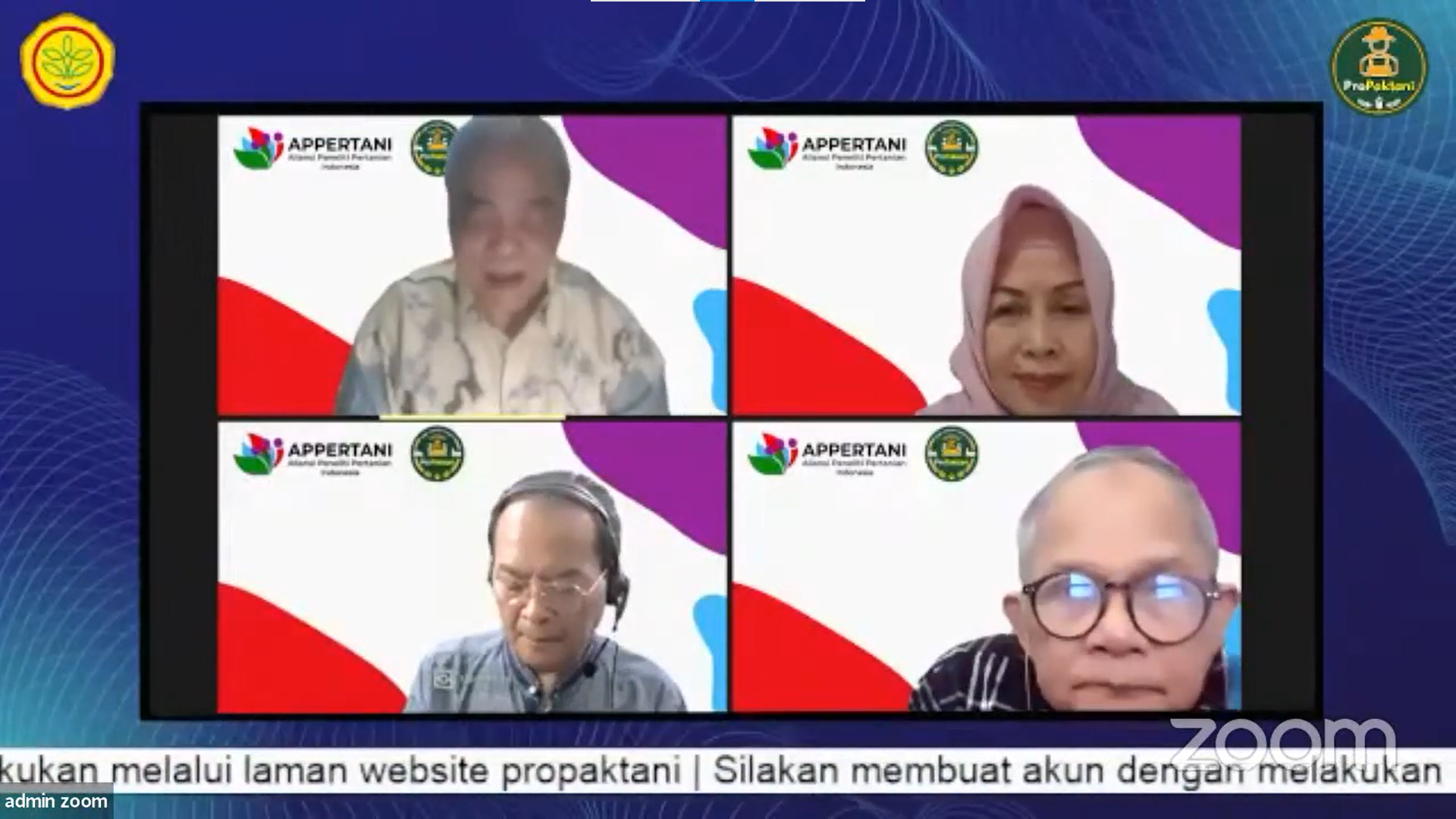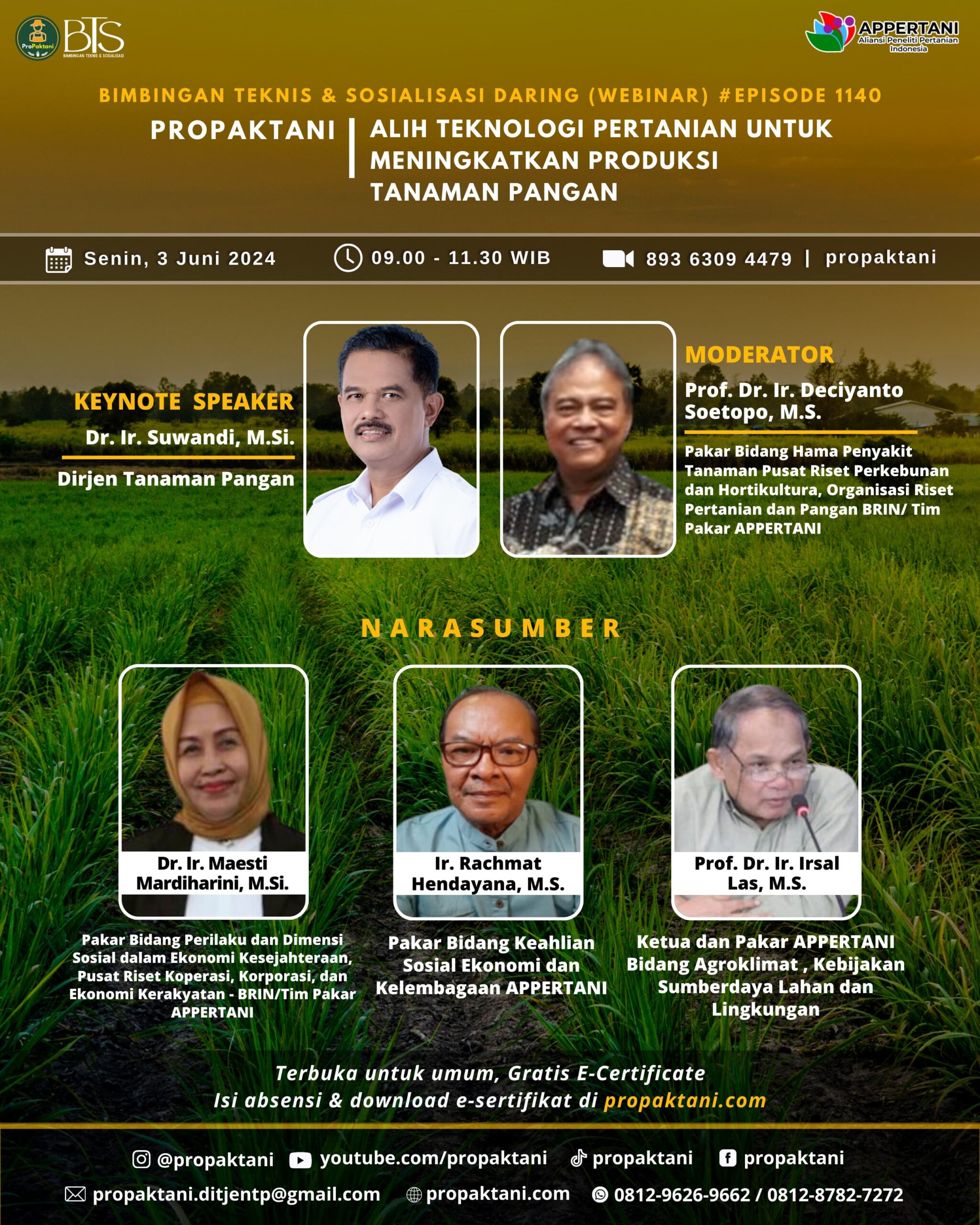Online Socialization and Technical Guidance (WEBINAR) #EPISODE 1140 PROPAKTANI

Transfer of Agricultural Technology to Increase Food Crop Production
The lessons learned from the success of increasing food crop production, especially rice in Indonesia from an importing country before the Green Revolution to a rice self-sufficient country for the first time in 1984, can be achieved mainly because of technology transfer through the synergy of researchers-extension workers and farmers. Over time, the issuance of the regional autonomy law and the SISNAS IPTEK law affect the technology transfer mechanism, amid demands to increase domestic rice production to achieve self-sufficiency and as a world food granary in 2045. Dr. Suwandi, Director General of Food Crops in his keynote speech emphasized that to achieve increased food crop production, changes in attitudes, skills and knowledge are needed. Propaktani episode 1140 organized by APPERTANI discusses the Transfer of Agricultural Technology to Increase Food Crop Production. The moderator of this webinar episode was Prof. Dr. Ir. Deciyanto Soetopo, MS, a researcher at the Center for Plantation Research, Agricultural and Food Research Organization, National Research and Innovation Agency (NRIA) who is also an APPERTANI Expert Team in the Field of Plant Pests and Diseases.

Ir. Rachmat Hendayana, MS., APPERTANI’s Expert Team for Socio-Economic and Institutional Expertise delivered the topic: “Disruption of Agricultural Technology Transfer Supports the Acceleration of Increasing Food Crop Production”, emphasizing the need for “disruption” in the transfer of agricultural technology to support the demand for increased domestic food production. Demand for rice continues to increase as the population increases to 354 million by 2045, with rice consumption increasing by 1.5% amid the negative impacts of climate change and land degradation. Other challenges in food production are dependence on chemical fertilizers and pesticides, market and price uncertainty, and lack of access to technology and information. Modern technologies open new opportunities and provide innovative solutions, allowing accurate and rapid monitoring to immediately take corrective action. Precision agriculture, improving the efficiency of the use of agricultural inputs.

Dr. Ir. Maesti Mardiharini, M.Si, NRIA Researcher and APPERTANI Expert Team in the Field of Behavior and Social Dimensions in Welfare Economy delivered material with the topic: “Optimization of Information Sources and Agricultural Innovation for Sustainable Productivity Improvement”. Farmers need information on cultivation techniques and natural resource management that can help in making better decisions. Information on climate change, markets, and agricultural policies allows farmers to adapt to changing conditions. Knowledge of sustainable agricultural practices will protect the environment and ensure long-term food security. Technological innovations speed up the production process, reduce losses, and increase efficiency. The use of advanced technologies such as smart irrigation, soil sensors, and satellite monitoring can increase crop yields. Innovation helps address challenges such as climate change, water shortages, and land degradation. Information and innovation needs, optimization strategies as well as challenges and solutions are presented in this webinar, accompanied by case studies in rural India.
Prof. Dr. Ir. Irsal Las, MS, Chairman and Expert of APPERTANI for Agroclimatic and Land Resources and Environmental Policy delivered material with the topic: “Challenges and Strategies of Transfer (Transfer-Down streaming) “Agricultural Technology-Innovation” in the Future”. Food availability greatly determines the level of prosperity, the main source of energy and nutrition for people’s lives, as well as being the source of household or family economy. The existence and availability of food is influential and intersects with national political security and stability. Food crops are dominant as public commodities, the technology and information produced are not easily commercialized, so it needs government intervention because it concerns the needs of everyone, including as a livelihood of farmers as producers. Food crops are dominated by annuals crops that are sensitive to environmental stress that require variations in technology and innovation. Technology transfer plays a strategic role in increasing food crop production. The elaboration of the strategy to accelerate downstream technology and agricultural innovation needs to involve NRIA, universities, other research institutions (private), Ministry of Agriculture, Local Government and farmers. At the stage of producing commercial and non-commercial research products, the NRIA, universities and other research institutions play a role. Ministry of Agriculture, such as the Agricultural Instrument Standardization Agency (BSIP) and the Directorate General of Technical play a role in standardization and dissemination together with research institutions and universities, in addition to providing feedback to producers of research products. At the downstream stage, it is necessary to involve local governments, the private sector and farmers in addition to the Directorate General of Technical, BSIP, research institutions and universities, as well as provide feedback on the suitability of research products.

